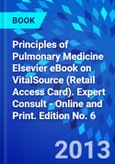- Focus on the clinical aspects and treatment of specific pulmonary and respiratory diseases, and understand the anatomy, physiology, and pathophysiology relevant to major pulmonary disorders. - Apply the material to real-life practice with case-based pulmonology questions covering topics including pulmonary function tests, physiologic data, and results of arterial blood gas testing. - Learn the latest diagnostic and therapeutic strategies with updated coverage of diagnostic modalities used in pulmonary disease, as well as management of asthma, lung cancer, respiratory failure, pulmonary hypertension, and other pulmonary diseases. - Visually grasp difficult concepts with high-quality images of the lung that complement discussions of specific diseases. - Efficiently review critical information in pulmonary medicine by skimming margin notes throughout the text. - Practice your knowledge with 200 case-based, self-assessment questions and apply pulmonology principles to real-life practice. - Access the complete contents online at Expert Consult, including NEW unique author audio chapter lectures, video clips, questions, additional audio recordings of lung sounds, supplemental images, and more.
Table of Contents
1. Pulmonary Anatomy and Physiology: The Basics
2. Presentation of the Patient with Pulmonary Disease
3. Evaluation of the Patient with Pulmonary Disease
4. Anatomic and Physiologic Aspects of Airways
5. Asthma
6. Chronic Obstructive Pulmonary Disease
7. Miscellaneous Airway Diseases
8. Anatomic and Physiologic Aspects of the Pulmonary Parenchyma
9. Overview of Diffuse Parenchymal Lung Diseases
10. Diffuse Parenchymal Lung Diseases Associated with Known Etiologic Agents
11. Diffuse Parenchymal Lung Diseases of Unknown Etiology
12. Anatomic and Physiologic Aspects of the Pulmonary Vasculature
13. Pulmonary Embolism
14. Pulmonary Hypertension
15. Pleural Disease
16. Mediastinal Disease
17. Anatomic and Physiologic Aspects of Neural, Muscular, and Chest Wall Interactions with the Lungs
18. Disorders of Ventilatory Control
19. Disorders of the Respiratory Pump
20. Lung Cancer: Etiologic and Pathologic Aspects
21. Lung Cancer: Clinical Aspects
22. Lung Defense Mechanisms
23. Pneumonia
24. Tuberculosis and Nontuberculous Mycobacteria
25. Miscellaneous Infections Due to Fungi and Pneumocystis
26. Pulmonary Complications in the Immunocompromised Host
27. Classification and Pathophysiologic Aspects of Respiratory Failure
28. Acute Respiratory Distress Syndrome
29. Management of Respiratory Failure
Appendix A: Sample Problems Using Respiratory Equations
Appendix B: Pulmonary Function Tests: Guidelines for Interpretation and Sample Problems
Appendix C: Arterial Blood Gases: Guidelines for Interpretation and Sample Problems








